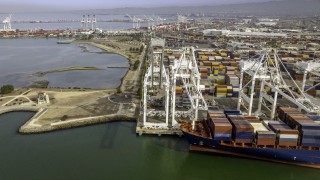West Coast Collaborative Ports Sector Workgroup

Summary
Ports, especially those along the West Coast, help provide many of the goods we use every day. Decreasing the sector's emissions is challenging because of the immense amount of power the machinery requires and because of the volume of existing infrastructure that need updating is immense. Recent advancements in technology promise a cleaner future. This page provides information and publicizes funding opportunities for a variety of emissions reduction projects including: alternative fuel use for vessels and on-shore equipment, equipment retrofits and early retirement, cold ironing for ocean-going vessels, and plug-in power for on-shore equipment. West Coast Collaborative (WCC) also funds a variety of Ports Projects and administers EPA funding programs such as the Diesel Emissions Reduction Act (DERA) and the Inflation Reduction Act's (IRA) Clean Ports programs.
Protecting Blue Whales and Blue Skies Joins EPA's SmartWay Program
Protecting Blue Whales and Blue Skies, a unique program with a goal to cut air pollution and protect endangered whales migrating off the coastal waters of Southern California and San Francisco Bay, recently joined SmartWay as an Affiliate. The Protecting Blue Whales and Blue Skies Program is a partnership that includes federal and local government agencies, foundations, academia and environmental nonprofits. The partnership manages an incentive-based Vessel Speed Reduction (VSR) program May through December 15, when endangered blue, humpback and fin whales migrate in abundance along California's coast. Ship strikes are a major threat to the whales globally, and to their recovery in California waters. Slower vessel speeds help prevent whale-ship collisions and whale injuries and deaths. The timing of the VSR program also coincides with the season when ground level ozone (smog) concentrations are typically high in California cities. By operating at the program's targeted, slower vessel speed (10-knots), ships also move at an efficient operating load that uses less fuel and generates reduced emissions.
As a SmartWay Affiliate, Protecting Blue Whales and Blue Skies will encourage the shipping companies, cargo owners and ports that it works with to also join SmartWay and help further reduce their air emissions and environmental footprint. Visit Blue Whales and Blue Skies to learn more. Container, car carrier and bulk carrier companies are eligible to participate in the program. Learn more about the companies and organizations that have recently joined SmartWay. To learn more about VSR, visit the EPA Ports Initiative website. To lean about EPA's SmartWay program, visit the SmartWay website.
In addition to the Protecting Blue Whales and Blue Skies Program, the National Oceanic and Atmospheric Administration (NOAA) issues voluntary VSR requests for all shipping companies with ships >300 gross registered tons to participate in. To learn more about voluntary VSR, visit the NOAA Channel Islands National Marine Sanctuary website.
Disclaimer
Reference to any specific commercial product, process, or service, by trade name, trademark, manufacturer, or otherwise, does not constitute or imply the endorsement, recommendation, or favor of West Coast Collaborative or its partners, including the United States Government.

